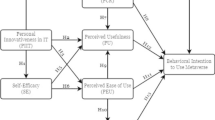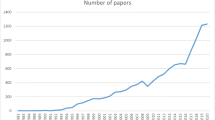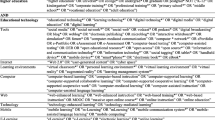Abstract
It appears that programme development in technology education is emerging from an atheoretical perspective. This could be attributed to the absence/neglect of conceptual frameworks (philosophical underpinning) in the development of programmes in technology education. This article explores the role of the content dimension of the 'essential features' of technology and technology education in OBE (Outcomes Based Education) related programme development. An instructional programme was developed using criteria derived from the essential features of technology and technology education. In order to gauge learners' experience, in relation to these essential features, a qualitative case study involving 20 learners was undertaken at a College of Education. Engagement with theprogramme proved to be an empowering experience for the learners who had hitherto not had the opportunity to experience a formal programme in technology education. Although it could not be proved conclusively that cognitive development had occurred, positive inter-dependence,shared responsibility, social skills and enhanced learning were evident. The study has shown that criteria derived from the 'essential features' of technology and technology education could serve as a reliable yardstick to measure the extent of learning in relation to these essential features
Similar content being viewed by others
REFERENCES
Ankiewicz, P., Myburg, C. P. H., van Rensburg, S. J.: 2001, ‘Assessing the Attitudinal Technology Profile of South African Learners: A Pilot Study’, International Journal of Technology and Design Education 11, 93–109.
Barnett, M.: 1994, ‘Designing the Future? Technology, Values and Choice’, International Journal of Technology and Design Education 4(1), 51–64.
Biehler, R. F. & Snowman, J.: 1993, Psychology Applied to Teaching, Houghton Mifflin, Boston.
Burges, R. G. (ed.): 1988, Strategies of Educational Research, The Falmer Press, London.
Coetsee, L. D.: 1992, in J. Kroon & P. L. Moolman (eds.), Psychological Characteristics of Entrepreneurs, Central Publications, Potchefstroom.
Creswell, J. W.: 1994, Research Design. Qualitative and Quantitative Approach, Sage Publications, London.
DeLuca, V. W.: 1992, ‘Survey of Technology Education. Problem-solving Activities’, The Technology Teacher 51(5), 26–30.
Denzin, N. K.: 1988, in J. P. Keeves (ed.), Educational Research, Methodology and Measurement: An International Yearbook, Pergamon Press, New York.
Department of Education: 1996, Curriculum Framework for General Education and Training, Pretoria.
Department of Education: 1997, Senior Phase (Grades 7 to 9) Policy Document, Pretoria.
De Swardt, A. E.: 1998, Technology Education and the Development of Thinking Skills: A Case Study, M.Ed. Mini-dissertation, Rand Afrikaans University, Johannesburg.
Eisenberg, E.: 1996, Essential Features of Technology Education, PATT (South Africa) Conference Proceedings, 36-38, 14-17 October 1996.
Gauteng Department of Education (GDE) and Gauteng Institute of Curriculum Development (GICD): 1999, Technology Progress Maps, 5-6, Johannesburg.
Givens, N. & Barlex, D.: 2001, ‘The Role of Published Materials in Curriculum Development and Implementation for Secondary School Design and Technology in England and Wales’, International Journal of Technology and Design Education 11, 137–161.
Glover, P.: 1996, What Are the Inescapable Features of Technology Education and What Do They Tell Us about the Development of a Technology Education Curriculum?, PATT (South Africa) Conference Proceedings, 12-15, 14-17 October 1996.
Henak, D. A.: 1992, ‘Enhancing Motivation with Experiential Learning’, in G. A. Edminson 1995 (ed.), Delivery Systems: Instructional Strategies for Technology Education, Reston, International Technology Education Association (ITEA).
Hammer, D.: 1997, ‘Discovery Learning and Discovery Teaching’, Cognition and Instruction 15(4), 485–529.
HEDCOM (Heads of Education Departments Committee): 1996, Draft National Framework for Curriculum Development in Technology Education, A report by the Technology 2005 Project Committee, Pretoria.
HEDCOM (Heads of Education Departments Committee): 1997, Technology 2005 Project: Curriculum Framework for Teacher Education, Pretoria.
ITEA (International Technology Education Association): 2000, Standards for Technological Literacy: Content for the Study of Technology, Reston, VA.
Johnson, S. D.: 1997, ‘Learning Technological Concepts and Developing Intellectual Skills’, International Journal of Technology and Design Education 7(3), 161–180.
Johnson, S. D. & Thomas, R.: 1992, ‘Technology Education and the Cognitive Revolution’, The Technology Teacher 51(4), 7–12.
Lincoln, Y. S. & Guba, E. G.: 1985, Naturalistic Inquiry, SAGE Publishers, London.
McCormick, R.: 1997 ‘Conceptual and Procedural Knowledge’, International Journal of Technology and Design Education 7(1-2), 141–157.
McCormick, R., Murphy, P. & Hennessy, S.: 1994, ‘Problem-solving Processes in Technology Education: A Pilot Study’, International Journal of Technology and Design Education 4(1), 5–34.
Merriam, S. B.: 1988, Case Study Research in Education. A Qualitative Approach, Jossey-Bass, San Francisco.
Moreland, J & Jones, A.: 2000, ‘Emerging Assessment Practices in the Emergent Curriculum: Implications for Technology’, International Journal of Technology and Design Education 10(3), 283–395.
Orlich, D. C., Harder, R. J., Callahan, R. C., Kauchak, D. P. & Gibson, H. W.: 1994, Teaching Strategies. A Guide to Better Instruction, Fourth Edition, D. C. Heath and Company, Toronto.
Reddy, K.: 2001, The Education of Pre-service Teachers in Technology Education, D.Ed. Thesis, Rand Afrikaans University, Johannesburg.
Sharpe, D. B.: 1996, ‘Out with the Old, in with the New’, Journal of Design and Technology Education 1(1), 24–36.
Swart, N. J.: 1992, ‘Opportunities’, in J. Kroon & P. L. Moolman (eds.), Entrepreneurship, Central Publications, Potchefstroom.
Technology 2005: 1996, The HEDCOM Technology Education Project, Discussion Document, Pretoria.
Tesch, R.: 1990, Qualitative Research: Analysis Types and Soft-ware Tools, Falmer Press, New York.
Van Rensburg, S. & Ankiewicz, P.: 1999, ‘Assessing South African Learners' Attitudes towards Technology by using the PATT (Pupils' Attitudes Towards Technology) Questionnaire’, International Journal of Technology and Design Education 9, 137–151.
Waks, L. J.: 1994, ‘Value Judgement and Social Action in Technology Studies’, International Journal of Technology and Design Education 4(1), 35–50.
Author information
Authors and Affiliations
Rights and permissions
About this article
Cite this article
Reddy, V., Ankiewicz, P., de Swardt, E. et al. The Essential Features of Technology and Technology Education: A Conceptual Framework for the Development of OBE (Outcomes Based Education) Related Programmes in Technology Education. International Journal of Technology and Design Education 13, 27–45 (2003). https://doi.org/10.1023/B:ITDE.0000039568.05480.c3
Issue Date:
DOI: https://doi.org/10.1023/B:ITDE.0000039568.05480.c3




